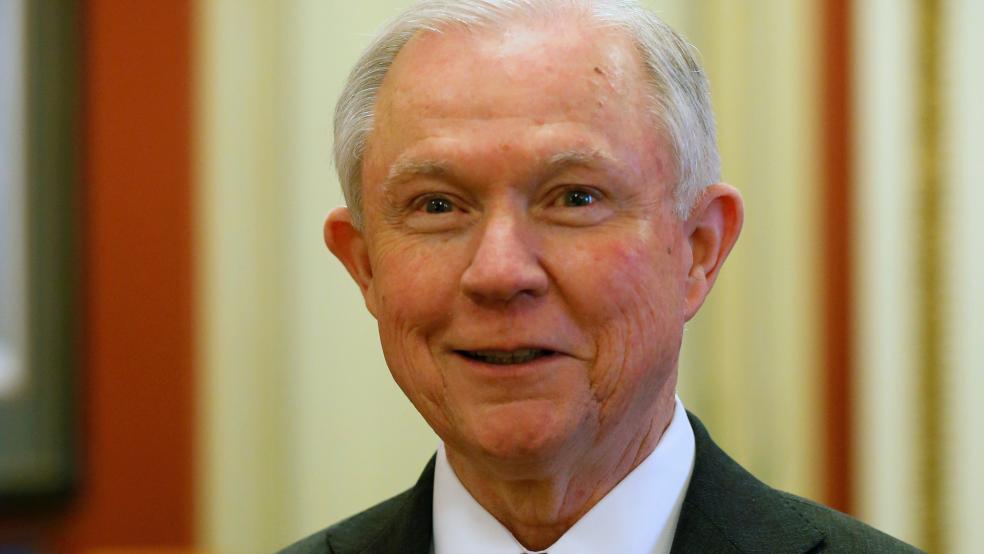The Senate’s vote to confirm Jeff Sessions as Attorney General Wednesday night is a watershed moment for the new Trump administration, because the former Alabama senator is, far more than any of President Trump’s other nominees for key positions, in close agreement with the White House on issues where Trump has promised sweeping change to current policy.
Other top cabinet positions have been filled with people whose loyalty and personal ties to Trump are not as ironclad as those of Sessions, the first senior Republican lawmaker to endorse the president at a time when Trump's candidacy was still viewed as a longshot at best.
Related: Americans Are Having Doubts About Trump’s Agenda: Poll
Secretary of State Rex Tillerson, the former CEO of Exxon-Mobil played no substantial role in Trump’s campaign and comes to the office with few connections to the administration. James Mattis and John Kelly, the secretaries of Defense and Homeland Security, are both retired career military men who have spent much of their time in office so far trying to calm lawmakers and nervous allies who are unsettled by the rapid and unpredictable changes being implemented by the new White House.
Even Neil Gorsuch, the federal judge tapped by Trump last week to fill the empty seat on the Supreme Court, has demonstrated independence from the White House. On Wednesday, Trump had continued his attacks on other federal judges currently hearing the case against his ban on refugees and residents of seven majority Muslim countries from entering the United States.
In a conversation with Sen. Richard Blumenthal (D-CT), Gorsuch said that he found Trump’s comments “disheartening” and “demoralizing.” After Blumenthal made the comments public, a Republican member of the team shepherding Gorsuch through the confirmation process confirmed them to The Washington Post.
There is little reason to expect similar hesitation from Sessions, at least when it comes to implementing Trump’s priorities with regard to the strict enforcement of immigration law, the toughening of criminal justice system, and the extension of support to state and local law enforcement agencies.
Related: Trump Plays the Fear Card as He Badgers Judges for Their Vote
To be clear, this is not because Sessions is a puppet of the new president. It is because he agrees with him.
Sessions jumped on the Trump train very early and even saw his top policy adviser, Stephen Miller, shift over to a key role with the Trump campaign. Miller was Sessions’ communications director, but the title underplays the importance of his role in helping Sessions and other conservative members of Congress develop policy positions on immigration and what Miller would call “nation-state populism.”
In an interview with Politico last summer, Miller described the role Sessions and his staff played in immigration debates on Capitol Hill, saying, “When I was in Sessions’ office, this movement for nation-state populism, the intellectual framework for that was being formed. ...We saw ourselves as a kind of think tank for immigration issues and linking that to the larger questions of globalism and populism.”
Unlike the majority of Trump’s cabinet picks, who have little or no experience in the federal government, Sessions will arrive at the Justice Department with a wealth of it. He is a former United States Attorney for the Southern District of Alabama and has spent 20 years in the United States Senate. While other nominees, like Education Secretary Betsy DeVos, are coming to grips with the realities of working for the federal government and trying to find the light switches, Sessions will be ready to move on day one.
Related: Trump May Try to Weed Out Immigrants Who Cost Taxpayers $279 Billion Annually
What that means is that the marching orders for US Attorneys across the country will be coming from an Attorney General who largely shares President Trump’s concern that immigrants, particularly undocumented immigrants, are a major threat to the physical safety and economic well-being of American citizens. It is a safe bet that prosecutorial resources will continue to be shifted sharply toward immigration-related enforcement.
It also means that state and local law enforcement can expect a sharp increase in support from the federal government. That will take the form of both closer cooperation and increased financial aid. The Attorney General has authority over a wide array of grant-making programs that support state and local police.
He also oversees the federal asset forfeiture program, which allows police to seize the assets of criminals and, in many cases, even of people who have not been convicted of a crime. The federal program allows the seizing agency to retain some or all of the property taken, a program that Trump has promised to support.
In sum, it seems likely that for the next four years, at least on President Trump’s signature law enforcement issues, there will be little daylight between the White House and the agency implementing them.





